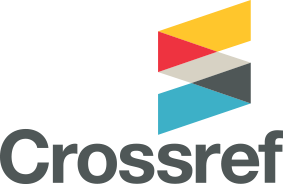Kesesuaian Hasil Pemeriksaan Antibodi Virus Herpes Simpleks Metode Enzyme-Linked Immunofiltration Assay dengan Enzyme-Linked Immunosorbent Assay
Abstract
Infeksi virus herpes simpleks (HSV) merupakan infeksi yang disebabkan oleh HSV tipe 1 (HSV-1) dan HSV tipe 2 (HSV-2). HSV-1 biasanya menyebabkan penyakit orofasial, sedangkan HSV-2 biasanya menyebabkan infeksi perigenital. Diagnosis infeksi HSV ditegakkan berdasarkan anamnesis, pemeriksaan fisis, dan laboratorium. Metode deteksi anti-HSV metode enzyme-linked immunosorbent assay (ELISA) memiliki sensitivitas 93–100% dan spesifisitas 95–100%, sedangkan metode enzyme-linked immunofiltration assay (ELIFA) memiliki sensitivitas 83,36–97% dan spesifisitas 83,93–98%. Tujuan penelitian adalah menilai kesesuaian hasil pemeriksaan anti-HSV antara metode ELIFA dan ELISA. Bila terdapat kesesuaian yang baik maka metode ELIFA dapat menggantikan metode ELISA. Penelitian dilakukan di laboratorium klinik RSUP Dr. Hasan Sadikin Bandung sejak bulan Januari–Mei 2011. Rancangan penelitian adalah potong lintang. Subjek penelitian adalah serum penderita tersangka infeksi HSV. Dilakukan analisis statistik untuk menilai agreement Kappa. Sebanyak 66 sampel diperiksa anti-HSV metode ELIFA dan ELISA. Hasil pemeriksaan IgM anti-HSV antara metode ELIFA dan ELISA memiliki kesesuaian baik (p<0,001; K=0,621), hasil pemeriksaan IgG anti-HSV-1 antara metode ELIFA dan ELISA memiliki kesesuaian sedang (p<0,001; K=0,533), dan hasil pemeriksaan IgG anti-HSV-2 antara metode ELIFA dan ELISA memiliki kesesuaian kurang (p=0,006; K=0,260). Simpulan, hanya pemeriksaan IgM anti-HSV metode ELIFA yang memiliki hasil kesesuaian baik dengan metode ELISA, sedangkan pemeriksaan IgG anti-HSV metode ELIFA memiliki kesesuaian sedang atau kurang. [MKB. 2012;44(3):152–8].
Kata kunci: IgM anti-HSV, IgG anti-HSV, kesesuaian, metode ELIFA, metode ELISA
Agreement of Herpes Simplex Virus Antibody Test Result between Enzymelinked Immunofiltration and Enzyme-linked Immunosorbent Assay Methods
Herpes simplex virus (HSV) infections are very common and are caused by HSV type 1 (HSV-1) and HSV type 2 (HSV-2). HSV-1 being mostly associated with orofacial disease, whereas HSV-2 is usually associated with perigenital infection. Diagnosis of HSV infection is established based on history, physical and laboratory examination. Enzyme-linked immunosorbent assay (ELISA) method to detect anti-HSV has a sensitivity 93–100% and specificity 95–100%, whereas enzyme-linked immunofiltration assay (ELIFA) has a sensitivity 83.36–97% and specificity 83.93–98%. The aim of this study was to assess the agreement of anti-HSV between ELIFA and ELISA methods. This study was conducted in the clinical laboratory RSUP Dr. Hasan Sadikin Bandung since January to May 2011. The study design was cross sectional. Subjects of this study were serum of patients suspected HSV infection. Statistical analysis was performed to assess Kappa agreement. A total of 66 samples were examined anti-HSV using ELIFA and ELISA method. There was good agreement between test results of anti-HSV IgM ELIFA and ELISA method (p<0.001, κ=0.621), moderate agreement between test results of anti- HSV-1 IgG ELIFA and ELISA method (p<0.001, κ=0.533), and fair agreement between test results of anti-HSV-2 IgG ELIFA and ELISA method (p=0.006, κ= 0.260). In conclusions, only the anti-HSV IgM ELIFA method has good agreement with ELISA.
DOI: http://dx.doi.org/10.15395/mkb.v44n3.86
Article Metrics
Abstract view : 7292 times

MKB is licensed under a Creative Commons Attribution-NonCommercial 4.0 International License
View My Stats






